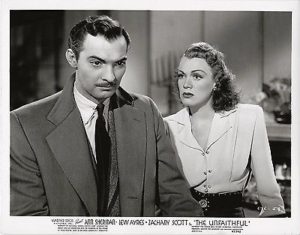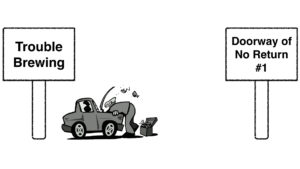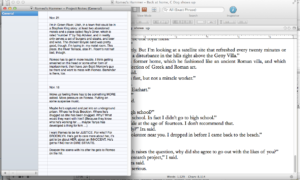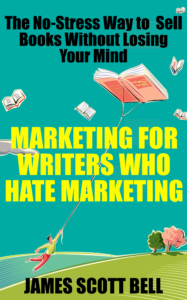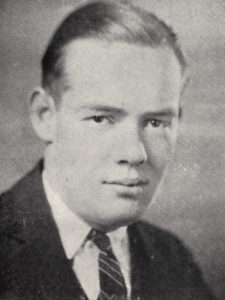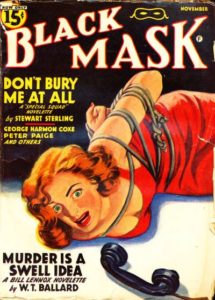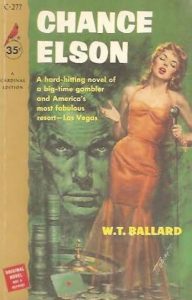by James Scott Bell
@jamesscottbell
 Today’s first-page critique raises an important craft issue: how much should you withhold from the reader when trying to inject mystery into the opening scene?
Today’s first-page critique raises an important craft issue: how much should you withhold from the reader when trying to inject mystery into the opening scene?
Mystery, one could argue, is the sine qua non of page-turning fiction. Why? Because you want the reader on the hook, desperate to know what happens next. You can’t have that without an element of mystery. And mystery involves holding back information.
Yet this requires a deft touch, especially in the opening pages. You are introducing the readers to the characters and story world. You want them to know enough to get into the scene, you want to dangle a bit of mystery, but you don’t want to overload the exposition. At the same time, you need to make sure the readers are not scratching their heads as they read along.
We’ll chat about all this on the other side of today’s anonymous first page:
***
January 1974
Egypt-Libya border
The blades of the search-and-rescue helicopter cut through salty air one thousand feet above the Mediterranean. The steep escarpment came into Temple’s view, sparse vegetation between ridges. His headset sputtered over the roar of the engines.
“Senator,” said the pilot, “I think that’s Lilah.”
Fingers clenched around the doorframe, Temple leaned into the wind and surveyed the scene below. Vehicles bound for Alexandria were stalled on the hilly pass by Gaddafi’s border patrol. The soldiers had separated the men from the women, holding them at gunpoint away from the caravan. Temple strained to spot the girl. “Where?” he shouted into the mouthpiece, blinking away gritty sand.
“Not with the crowd, sir. Check the port side,” the pilot said. “Look for yellow clothes.”
There. A figure running between boulders, her robes fluttering behind. Lilah was a couple of hundred feet from the group under inspection, concealing herself behind the limestone formations. She looked up at the chopper before plastering herself to the side of a rock. After weeks of reconnaissance, they’d located one of the abducted teenagers, the daughter of the late ambassador.
“She’s hiding from the border patrol,” Temple muttered. “What about the boy? There were two kids.”
“Probably with the caravan. Let me—” The pilot stopped to curse. “We have a problem, Senator.”
One of the soldiers had detached himself from his team to follow Lilah. If she got caught, there was little a single search-and-rescue chopper could do to help. Temple grabbed the AK-47. He did not have the skill to hit the target from this distance, but he could buy her some time.
“Hold position and inform the ground team,” Temple hollered.
Temple’s fingers trembled when he took aim. His stint in the army between world wars had not involved active combat. The helicopter shuddered. With a gasp, Temple tumbled back into the seat. Sweat trickled down his neck.
When he checked the terrain again, Lilah was not where she had been, but her yellow robes made her easy to spot even behind the rocks at the far border of an open space. The soldier in pursuit sprinted across the clearing, toward Lilah. Temple swore and took aim, once more.
Before he could press the trigger, there was a sudden blast on the ground. The soldier’s body disintegrated, ripped into pieces and scattered across the territory. Temple’s mouth fell open, and sounds struggled to escape.
***
JSB: There is much to commend here, not the least of which, of course, is that it opens with action and disturbance. In keeping with the thriller genre, we’ve got a girl in immediate danger as a rescue chopper tries to save her.
The writing is crisp and sure. I like Plastering herself to the side of a rock. I also like how details are marbled in with the action, never slowing things down.
My notes, then, are fine tuning, but with one major issue to resolve.
Let’s do the fine tuning first.
Character Name
I’d give Temple’s first name up front. I thought Temple was the first name of a woman. The next line clears that up, but unless there’s a strong reason we only know this character as Temple throughout (and I can’t think of one), give us the full name.
Dialogue Attributions
Always place an attribution after the first complete sentence or clause. Thus:
“Not with the crowd, sir. Check the port side,” the pilot said. “Look for yellow clothes.”
Should be:
“Not with the crowd, sir,” the pilot said. “Check the port side. Look for yellow clothes.”
1 + 1 = 1/2
This is a Sol Stein rule I have found quite helpful. Stein, a legendary fiction editor and a novelist himself, held that when you use two different words or terms to describe something, the overall effect is diluted rather than strengthened. The writer should choose the most evocative descriptor and ditch the other one. This sentence threw me:
The soldier’s body disintegrated, ripped into pieces and scattered across the territory.
Something that disintegrates does not rip. The two images work against each other.
I suggest sticking with disintegrated here, and render what that would look like. I see red … but that’s as far as I am going to go before breakfast.
Also, territory implies a huge expanse of land. An exploding body would cover an area.
Cursing
I appreciate the author using The pilot stopped to curse and Temple swore. We’ve had several discussions here at TKZ on this issue. See, for example, here. My view is that the scene loses nothing, and no potential readers will be turned off when they sample the book.
And now for my main issue …
I’m not a writer of military thrillers, so perhaps others can chime in (Brother Gilstrap?). But here we have a United States Senator, probably in his mid-60s, in a military chopper, firing an AK-47 (would this be the correct weapon in this context?) We’re told the senator doesn’t have great skill and that he was never in combat. So how on earth is he in this position, as opposed to trained military? Perhaps the author is withholding this information to extend a mystery. Maybe the next page gives us the whole story. Ha!
But let’s deal with what we’ve got.
My standard advice in the opening is to act first, explain later. But as with all axioms, it requires some expansion. There are times when we need a bit of exposition to clue us in, or a line of backstory to explain a situation (Note: In workshops I tell my students they can have three lines of backstory in their first ten pages, used all at once or together.)
It would not be hard to come up with an interior thought or a couple lines of dialogue to at least give us a hint of why this situation has occurred. We don’t need all of it … yet. But as is, I fear readers are likely to think the situation isn’t plausible.
Also, why aren’t the soldiers firing back at the low-flying chopper?
To sum up, this is fine thriller style and potentially a gripping opening scene. If the major issue I’ve mentioned can be cleared up—and if the weaponry and other military details are sound—we’re off to a great start.
I’m at a writers conference today and may not be able to comment as much as I’d like. So have at it, TKZers. Anything else you’d like to offer our anonymous author?
 ”I am happiest writing in small rooms. They make me feel comfortable and secure. And it took me years to figure out that I need to write in a corner. Like a small animal burrowing into its hole, I shift furniture around, and back myself into a cozy corner, with my back to the wall … and then I can write.”
—Danielle Steel
”I am happiest writing in small rooms. They make me feel comfortable and secure. And it took me years to figure out that I need to write in a corner. Like a small animal burrowing into its hole, I shift furniture around, and back myself into a cozy corner, with my back to the wall … and then I can write.”
—Danielle Steel
